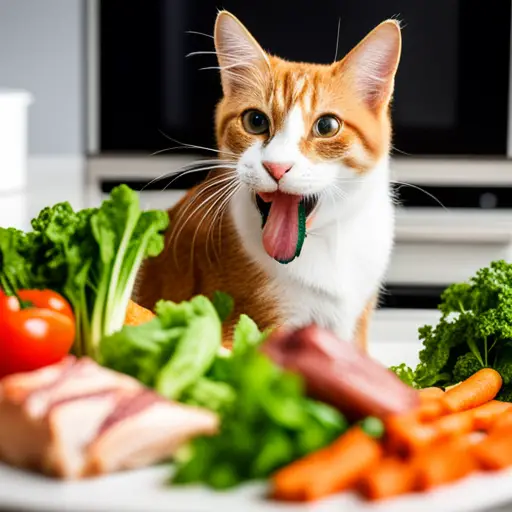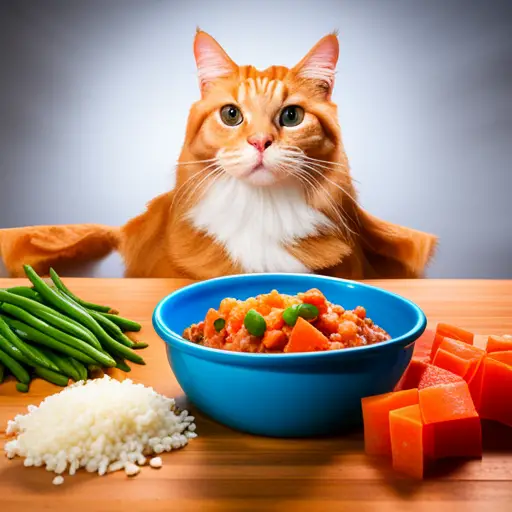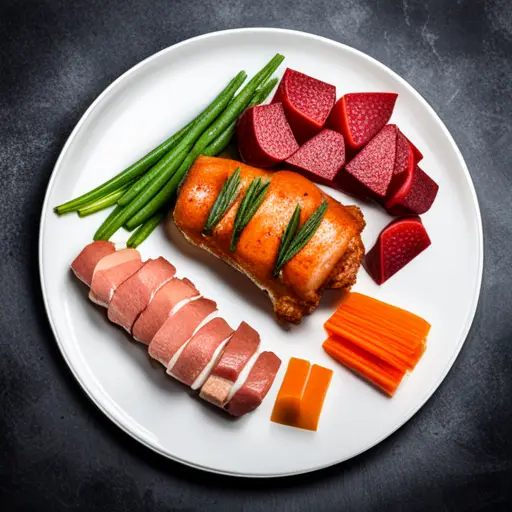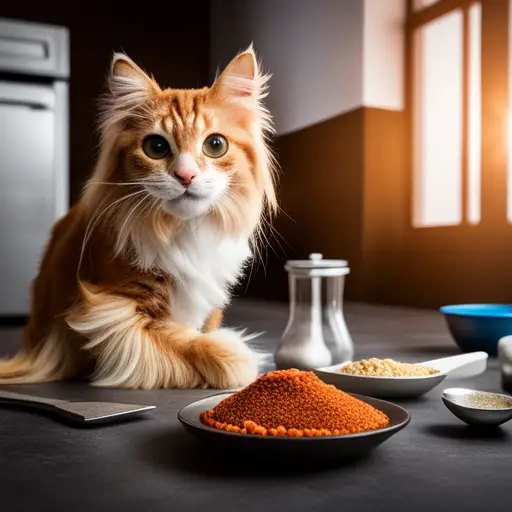Are you tired of feeding your furry friend the same old canned cat food every day? Your feline companion deserves the best, and that includes homemade meals that are both tasty and nutritious.
Think of your cat as a gourmet food critic who deserves only the freshest and most delicious ingredients.
With some simple recipes and a little bit of effort, you can become a master chef for your feline friend.
Homemade cat food has numerous benefits. First and foremost, you have complete control over what goes into your cat’s meals. This means that you can avoid any potentially harmful additives or preservatives that might be found in commercial cat food.
Additionally, homemade cat food allows you to cater to your cat’s specific dietary needs, whether that means avoiding certain ingredients or incorporating more variety into their diet.
Plus, making your own cat food can be a fun and rewarding experience for both you and your furry friend.
So why not give it a try?
Key Takeaways
– Homemade cat food can be tasty, nutritious, and tailored to a cat’s specific dietary needs.
– Store-bought cat food may contain harmful additives and preservatives.
– Proper nutrition, including a balanced diet of protein, fats, and carbohydrates, is crucial for a cat’s overall health and well-being.
– Consulting with a veterinarian and practicing proper food safety and storage can help prevent health problems and ensure a cat’s nutritional needs are being met.
Benefits of Homemade Cat Food

Making your own cat food has numerous benefits, including providing a healthier diet for your furry friend and allowing you to control the ingredients.
One of the primary benefits of homemade cat food is that it can be cost-effective. When you make your cat food at home, you have the ability to purchase ingredients in bulk, which can save you money in the long run.
You also have the option to tailor your cat’s diet to their individual needs, which can help prevent costly health problems down the road.
Another benefit of homemade cat food is that it allows you to provide personalized nutrition for your furry friend. Store-bought cat food often contains preservatives and fillers that may not be the best for your cat’s health.
When you make your own cat food, you have the ability to choose high-quality ingredients that are tailored to your cat’s unique needs. This can help improve their overall health and well-being, leading to a happier and healthier pet.
So why not give it a try and see the benefits of homemade cat food for yourself?
Simple Homemade Cat Food Recipes

You can whip up these easy meals for your feline friend with ingredients you probably already have, giving them a taste of home cooking that’s purrfectly suited to their palate. Homemade cat food is not only more budget-friendly than store-bought options, but it also allows you to control the quality and quantity of ingredients that go into your cat’s diet. Plus, you can customize the recipe to suit any dietary restrictions your fur baby may have.
One simple option is to mix cooked chicken or turkey with cooked rice and steamed vegetables, such as carrots or green beans. Another recipe is to blend cooked liver or heart with canned pumpkin and a little bit of water for a delicious and nutrient-packed meal.
By making your own cat food, you can ensure that your furry friend is getting the best possible nutrition while enjoying a variety of tasty options.
Advanced Homemade Cat Food Recipes

For more complex options in feline cuisine, try incorporating various proteins like fish or beef into your cat’s diet. With careful ingredient selection and recipe modifications, you can create advanced homemade cat food recipes that your furry friend will surely love.
Here are some ideas to get you started:
– Beef and liver stew: This recipe includes beef, liver, carrots, and peas for a hearty and nutritious meal that’s perfect for picky eaters.
– Tuna and egg patties: Mix canned tuna, eggs, and breadcrumbs to create patties that you can bake or fry for a delicious and protein-packed meal.
– Chicken and pumpkin soup: This recipe combines chicken, pumpkin, and rice to create a comforting and flavorful soup that your cat will enjoy on a cold day.
– Salmon and sweet potato cakes: Mix canned salmon, mashed sweet potatoes, and egg for a tasty and nutritious treat that your cat will love to nibble on.
– Lamb and lentil stew: This recipe includes lamb, lentils, carrots, and spinach for a hearty and healthy meal that your cat will devour.
Introducing homemade food to picky eaters can be a challenge, but with patience and persistence, you can help your cat develop a taste for new flavors and textures. Start by mixing a small amount of homemade food with your cat’s regular diet, and gradually increase the proportion over time.
Remember to consult with your veterinarian to ensure that your cat’s nutritional needs are being met with the new diet. With these tips and recipes, you can provide your furry friend with a variety of delicious and healthy homemade meals.
Tips for Making Homemade Cat Food

If you’re considering making homemade cat food, there are a few things you should keep in mind to ensure your cat is getting proper nutrition.
First, make sure you’re including all the necessary nutrients in your cat’s diet.
Second, pay attention to food safety and storage to prevent any contamination or spoilage.
And finally, portion control is key to maintaining a healthy weight for your furry friend.
Keep these tips in mind to create a balanced and nutritious homemade cat food.
Proper Nutrition for Cats
Proper nutrition is crucial for your feline friend’s overall health and well-being. Just like humans, cats require a well-balanced diet to maintain a healthy weight and prevent illnesses. It is important to understand your cat’s nutritional needs and provide them with the right nutrients to ensure a long and healthy life.
To make sure that your cat is receiving the right amount of nutrients, it is important to follow a feeding schedule and provide them with a variety of foods. A balanced diet for cats should consist of protein, fats, and carbohydrates. Below is a table that shows the recommended daily intake of each nutrient for an average adult cat weighing around 10 pounds.
| Nutrient | Daily Recommendation |
|---|---|
| Protein | 4-5 oz |
| Fats | 2-3 oz |
| Carbohydrates | 1 oz |
By providing your cat with the right nutrients and following a feeding schedule, you can help prevent cat food allergies and ensure that your feline friend stays healthy and happy. Remember to always consult with your veterinarian before making any changes to your cat’s diet.
Food Safety and Storage
When it comes to keeping your furry friend healthy, food safety should be a top priority. Always make sure to handle your cat’s food with clean hands and utensils, and avoid cross-contamination with other foods.
It’s also important to store your cat’s food properly, as this can affect its shelf life and overall safety. One way to ensure safe storage is to keep your cat’s food in an airtight container in a cool, dry place. Avoid storing it in areas that are too humid or hot, such as near a window or in a garage.
Additionally, be sure to check the expiration date on the packaging and discard any expired food. By taking these small precautions, you can help keep your kitty healthy and happy.
Portion Control
You need to be mindful of how much you’re feeding your cat to ensure they maintain a healthy weight and avoid health issues. Portion control is essential when it comes to homemade cat food, as it’s easy to overfeed your kitty with homemade meals that are often more nutritious and flavorful than commercial cat food.
Overfeeding can lead to obesity, which can cause a range of health problems for your cat, including diabetes, heart disease, and joint issues. To ensure your cat is getting the right amount of food, it’s important to measure their meals. You can use a kitchen scale to weigh portions, or you can use measuring cups.
The amount of food your cat needs will depend on their age, weight, and activity level. It’s best to consult with your veterinarian to determine the appropriate portion sizes for your cat. With proper portion control, you can help your kitty maintain a healthy weight and live a long, happy life.
Conclusion
Congratulations, you’ve reached the end of this article about homemade cat food recipes that your furry friend will absolutely adore!
As a cat owner, you understand the importance of providing your feline with the best possible nutrition and care. By making your own cat food, you have complete control over what goes into your cat’s diet, ensuring that they receive all the necessary nutrients they need to thrive.
Did you know that a recent study revealed that commercial cat food might not always be the healthiest option for your cat? It was found that certain brands may contain harmful additives and preservatives that can lead to health problems in the future.
By choosing to make your own cat food, you can eliminate these concerns and provide your cat with a healthy and balanced diet that they will love. So why not give it a try? Your cat will thank you for it!
